Why Knowing RBT Certification Costs Matters
Becoming a Registered Behavior Technician (RBT) is a crucial step for professionals who want to specialize in autism therapy and applied behavior analysis. Understanding the costs involved in earning and maintaining this credential can help candidates plan their professional journey effectively. This article breaks down the expenses from training through ongoing renewal and highlights the financial commitment involved in becoming an RBT.
Breakdown of Initial Certification Costs
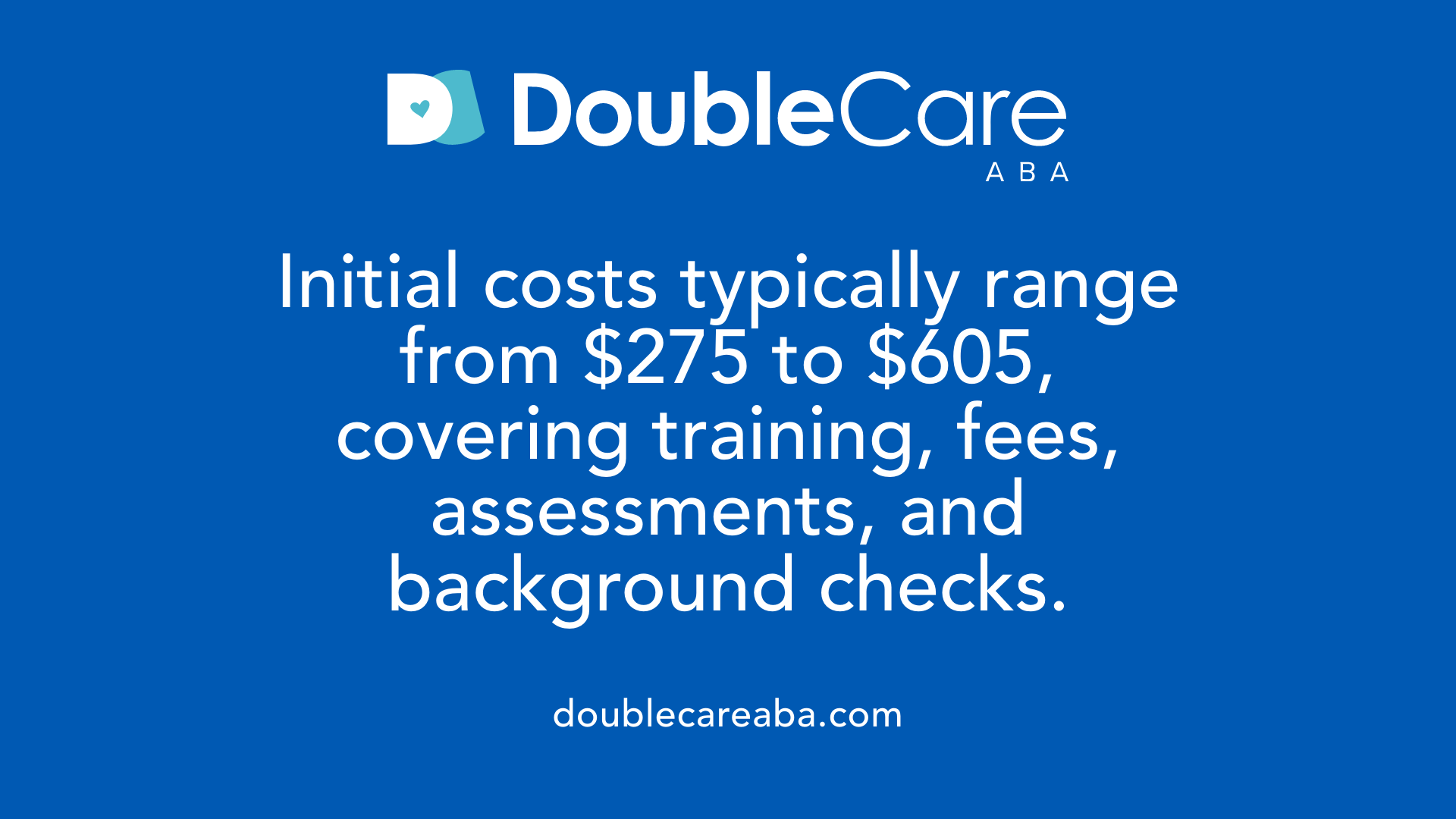
What are the main costs involved in obtaining RBT certification?
The process of becoming a Registered Behavior Technician (RBT) involves several essential expenses. First, candidates must complete a 40-hour training course, which typically costs between $100 and $300 depending on the provider. Some options may be less or even free, but most fall within this range.
Next, applicants must pay the Behavior Analyst Certification Board (BACB) application fee, which is a non-refundable charge of $50. Following the application, candidates take the certification exam with a fee of approximately $45.
Another important expense is the competency assessment conducted by a qualified Board Certified Behavior Analyst (BCBA). This assessment usually costs between $50 and $150, depending on the assessor or organization.
Additionally, a background check is often required as part of the certification process. This can cost anywhere from $30 to $60.
These components combined mean the initial costs for RBT certification generally range from $275 to $605, with some flexibility depending on training and assessment choices. Candidates should budget accordingly to cover training, fees, assessments, and background checks as part of their certification journey.
Variability in Training Course Costs and Options
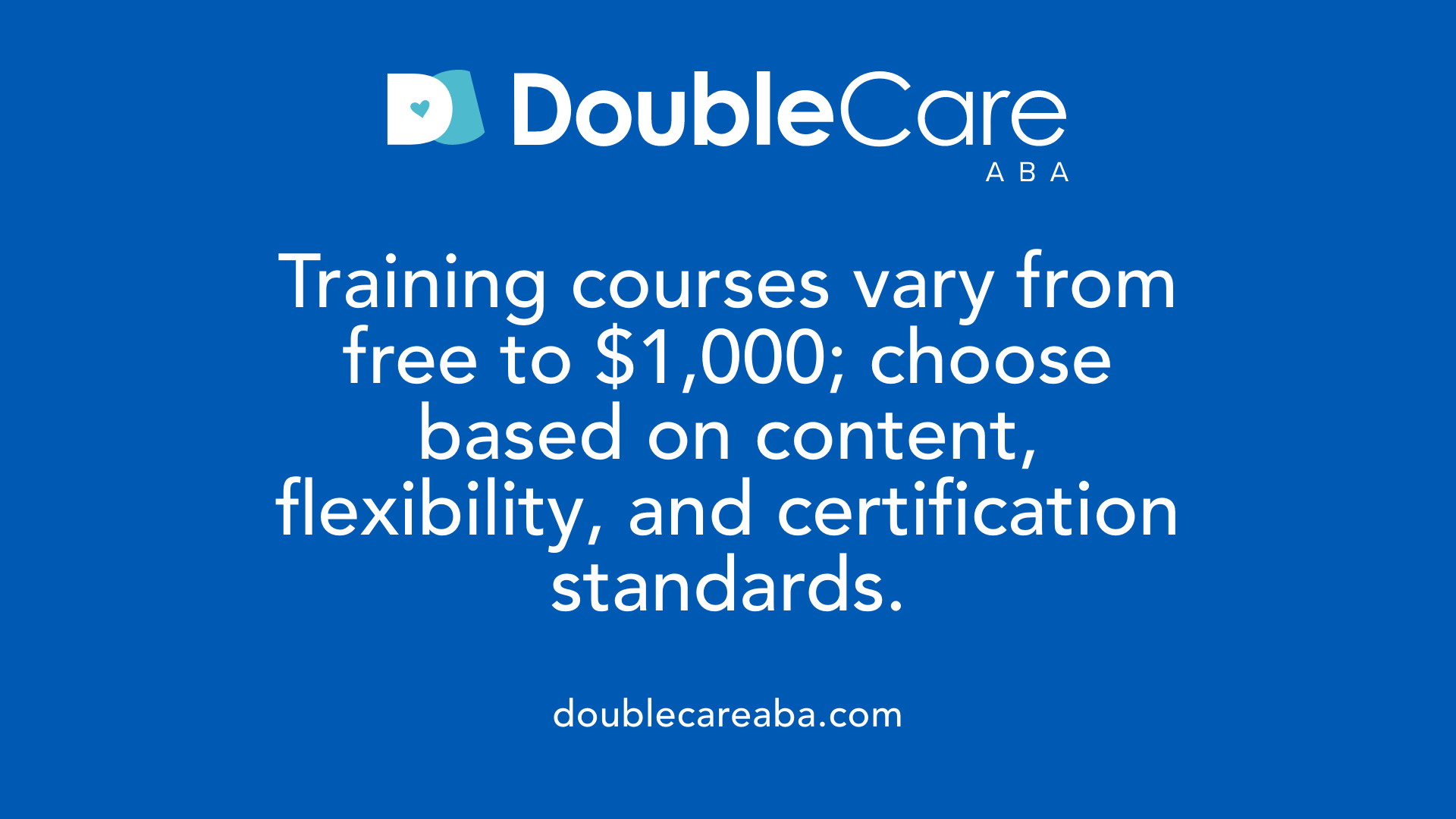
How much do RBT training courses typically cost and what do they include?
RBT training courses show a notable range in cost, reflecting different providers and delivery methods. Prices can range from completely free online programs to paid courses that may cost up to $1,000. More commonly, a 40-hour training course—which is required for RBT certification—falls between $100 and $300.
These courses cover the RBT Task List, which sets the foundational knowledge and skills for candidates. A crucial part of the curriculum involves at least three hours dedicated to ethics and professional conduct, ensuring that future RBTs understand the ethical responsibilities tied to their role.
Some providers offer flexible payment options, such as weekly fees starting as low as $29. Additionally, free courses are available, although candidates should verify they meet the BACB's standards to qualify for certification.
Given this variability, candidates can select from a range of training options that balance affordability with comprehensive content coverage, meeting the necessary educational requirements for the RBT credential.
Application and Examination Fees Explained
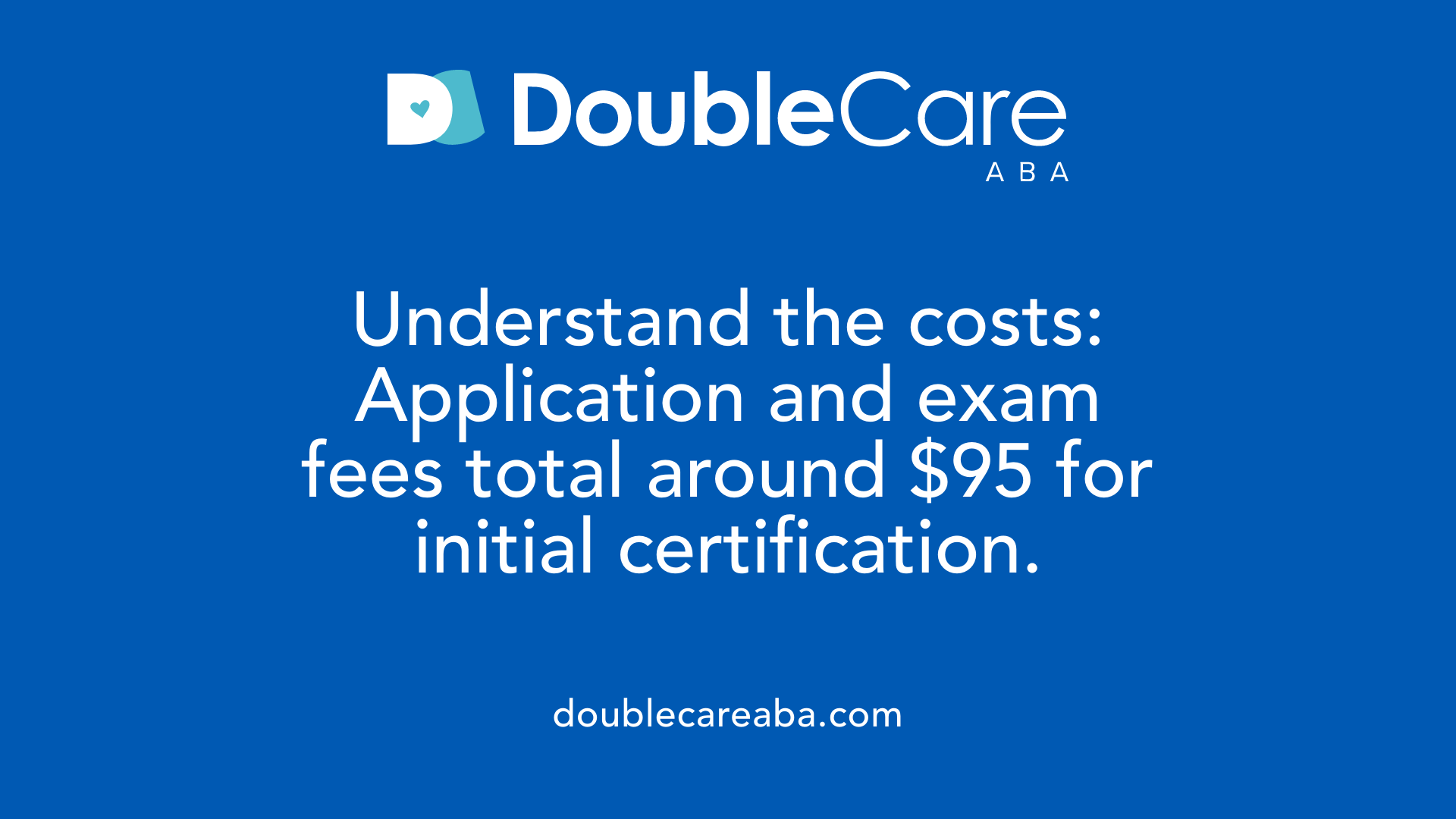
BACB Application Fee
To begin the process of becoming a Registered Behavior Technician (RBT), candidates must submit an application to the Behavior Analyst Certification Board (BACB). This application requires a non-refundable fee of $50. This fee secures your place in the certification process and covers the administrative costs associated with processing your application.
Exam Structure and Fee
Following the application, candidates must successfully pass the RBT certification exam. The exam fee is approximately $45. This fee grants access to the exam which must be scheduled and completed within the guidelines set by the BACB.
Exam Content Areas
The RBT exam is designed to comprehensively evaluate the candidate's knowledge and skills across several critical domains within applied behavior analysis. It consists of 75 multiple-choice questions covering:
- Assessment techniques
- Behavior reduction strategies
- Documentation and reporting
- Measurement of behavior
- Professional conduct and ethics
- Skill acquisition methods
This diverse range of topics ensures that RBT candidates are ready to undertake their role with a solid understanding of essential principles and ethical responsibilities.
Overall, the total fees paid directly to the BACB for certification amount to about $95, including both the application and exam fees. This investment is a vital step for those entering the field of behavioral therapy.
Additional Certification-Related Expenses
What Are Other Expenses Candidates May Incur During the RBT Certification Process?
Beyond the primary costs of training, application, and exam fees, candidates should be prepared for several additional expenses in the RBT certification journey.
One such expense is the background check, which is typically required and costs between $30 and $60. This step ensures the candidate’s suitability for working with vulnerable populations.
Competency assessments are another necessary expense, generally ranging from $50 to $150. These assessments must be completed under the supervision of a Board Certified Behavior Analyst (BCBA) to verify the candidate's practical skills aligning with RBT standards.
To better prepare for exams and assessments, candidates might also invest in study materials costing between $20 and $50. These resources help reinforce learning and improve success rates.
Additionally, some candidates may opt for tutoring to strengthen their understanding in challenging areas. Tutoring fees typically range from $50 to $100 per hour, varying by provider and the extent of assistance needed.
These extra costs add to the overall financial commitment of becoming an RBT but can considerably support candidates in achieving certification effectively.
Ongoing Costs for Maintaining RBT Certification
What ongoing financial commitments are required to maintain RBT certification?
Maintaining RBT certification involves several ongoing costs and requirements. First, RBTs must renew their certification annually. The renewal process includes a fee, typically around $35, which is necessary to keep the credential active.
Continuing education is another important ongoing commitment. Certified RBTs are required to complete continuing education units (CEUs) every year to ensure they stay current with best practices and ethical standards. Each CEU can cost between $10 and $50, depending on the course or provider.
In addition to fees and education, supervision is a critical element of maintaining certification. RBTs must receive supervision for at least 5% of their working hours monthly, which must include at least two face-to-face contacts. These contacts can be in person or through webcam. While supervision itself is mandatory, its associated costs can vary widely depending on the supervisor or organization.
Overall, these ongoing financial commitments ensure that RBTs continue to perform competently and ethically in their field while keeping their certification valid.
Financial Assistance and Cost-Reducing Opportunities
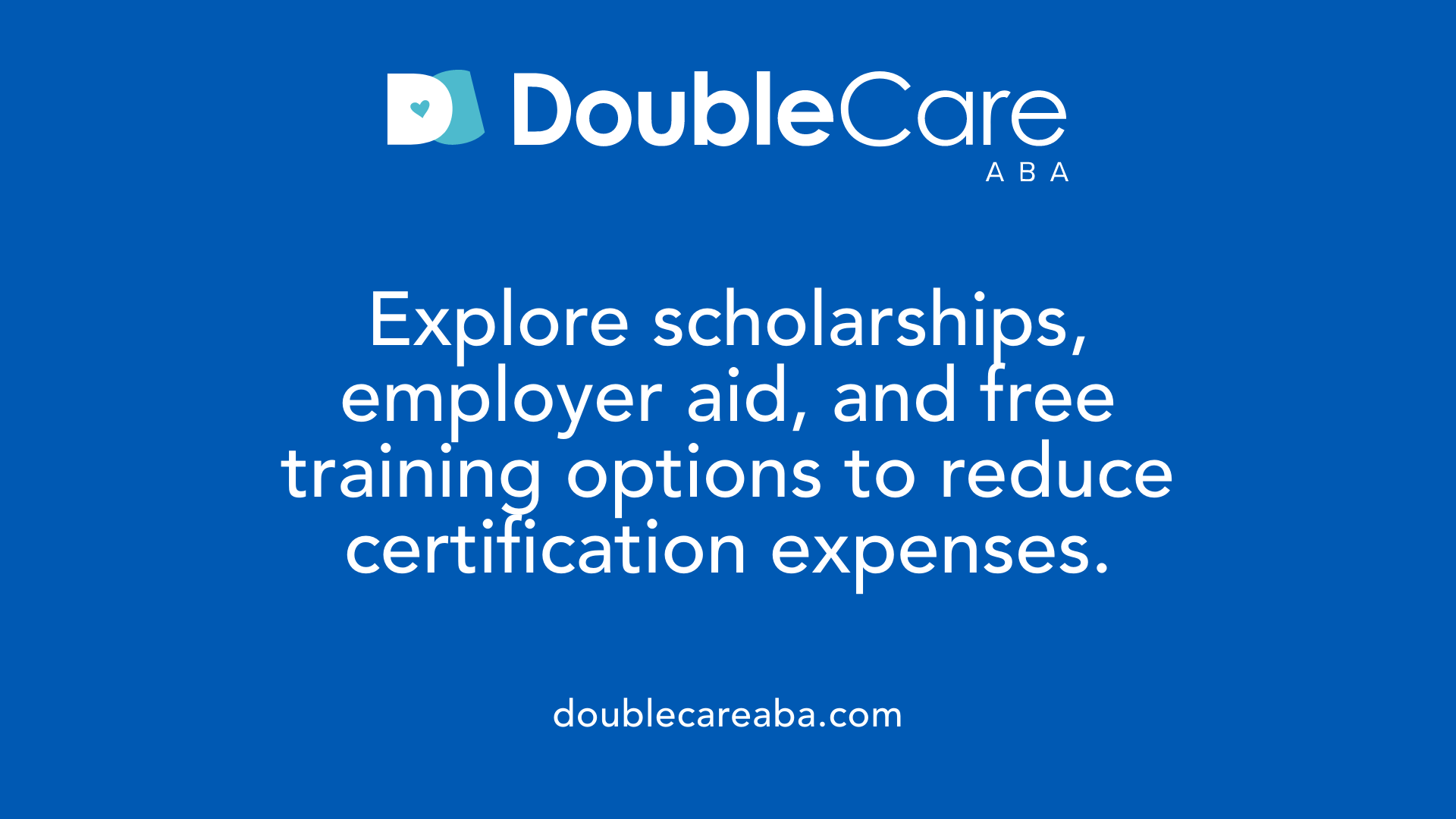
Are there ways to reduce or offset the costs of RBT certification?
Yes, several opportunities exist to help reduce the financial burden of obtaining RBT certification. Some organizations, like Songbird, offer to cover exam and certification fees for candidates, significantly lowering upfront expenses.
In addition, free online training resources provide the required 40-hour coursework at no cost, making it more accessible for individuals without the ability to pay for traditional training programs. These free options allow candidates to complete essential education without incurring huge expenses.
Employers also play a role in easing costs by sponsoring certification expenses or offering financial assistance and scholarships to their employees pursuing RBT credentials. This support can help cover fees for training, application, and exams, making the path to certification more affordable.
Exploring these options can substantially reduce the total cost, which might otherwise range anywhere from $100 to over $800, ensuring more candidates can access and benefit from this valuable certification in behavioral therapy and autism support.
Projected Return on Investment for RBT Certification
Job Market Growth
The demand for Registered Behavior Technicians (RBTs) is on the rise, with a projected 16% growth in employment opportunities from 2018 to 2028. This growth reflects increased recognition of the importance of behavioral therapy and autism treatment, making the RBT credential increasingly valuable.
Salary Potential
While the total cost of obtaining RBT certification ranges widely—from about $100 to $1,000 depending on various fees and course expenses—earning potential is promising. Qualified RBTs can earn up to $50,000 annually. When viewed alongside the relatively modest upfront costs, this salary potential makes certification a sound financial investment.
Career Opportunities in Autism Therapy
RBTs play a vital role in applied behavior analysis (ABA) therapy, particularly in supporting individuals with autism. The certification opens doors to diverse job opportunities within healthcare settings, schools, and private practice. As the need for autism-focused care grows, so do career prospects for those holding the RBT credential.
How does the cost of RBT certification compare to potential earnings and job prospects?
Though the total expenditure for certification—including coursework, exam fees, and assessments—ranges from $100 to $1,000, the expanding job market and competitive salaries make the investment worthwhile. The certification not only equips candidates with essential skills but also aligns with an upward job trend and attractive salaries up to $50,000 per year, establishing a strong return on investment.
Comprehensive Steps in the RBT Certification Process
What are the procedural steps to become a certified RBT?
The process to become a Registered Behavior Technician (RBT) is clearly structured to ensure candidates develop the necessary skills and knowledge.
First, candidates must complete a 40-hour training course based on the RBT Task List. This coursework covers essential topics, including at least three hours dedicated to ethics and professional conduct. Training courses vary in cost and may be available free or range up to several hundred dollars depending on the provider.
Next, candidates undergo a competency assessment. This practical evaluation is conducted by a Board Certified Behavior Analyst (BCBA) to verify the candidate's ability to apply learned principles effectively.
Following successful competency demonstration, candidates submit an application to the Behavior Analyst Certification Board (BACB), accompanied by a non-refundable application fee of $50.
After application approval, candidates take the RBT certification exam, which includes 75 multiple-choice questions covering areas such as behavior reduction, measurement, skill acquisition, and professional conduct. The exam fee is approximately $45.
Upon passing the exam, candidates receive their RBT credential, confirming they have met the professional standards required for practice in applied behavior analysis.
These steps ensure that individuals are appropriately trained, assessed, and qualified before delivering behavioral services.
Summary of Typical Financial Outlay for RBT Certification
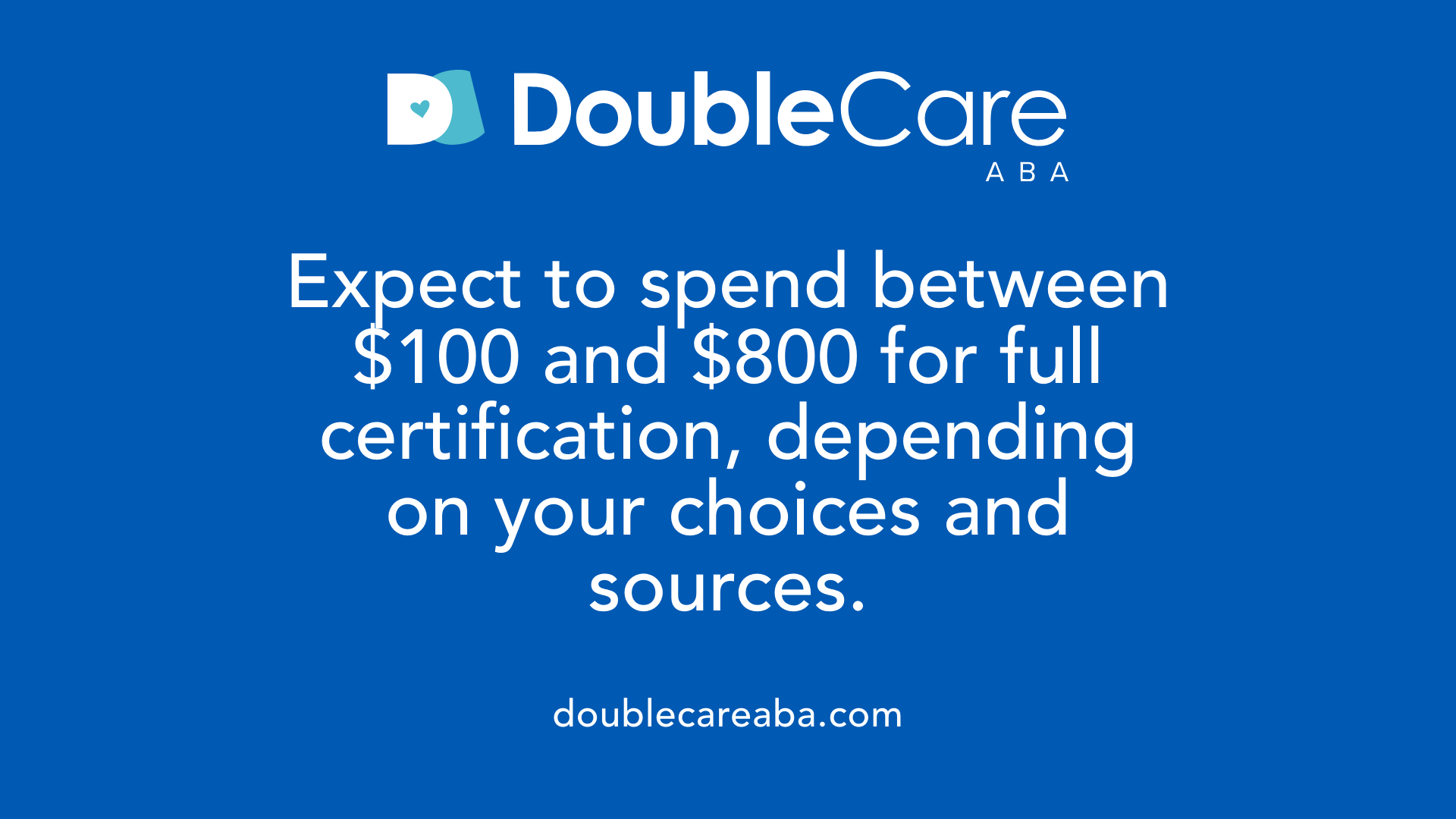
What is the typical total cost range to become RBT certified?
The total cost to obtain Registered Behavior Technician (RBT) certification generally falls between $100 and $400. However, depending on specific choices related to training providers, competency assessments, and additional fees, the range can extend up to around $1,000.
Range of total certification cost
RBT certification requires a variety of fees, including mandatory ones like the $50 application fee and $45 exam fee. Additional costs often entail the 40-hour training course, which can range from free to over $500, competency assessment fees ($50–$150), background checks ($30–$60), and study materials or tutoring that further influence the total expenditure.
Factors affecting cost variation
Costs vary widely based on factors such as the selection of training providers—some offer affordable or even free coursework while others are more premium. Competency assessments must be passed with a Board Certified Behavior Analyst (BCBA) and can differ by supervisor fees. Background check expenses and whether an organization covers some fees also adjust overall cost.
Typical price thresholds
Most candidates find that certification costs do not exceed $800 when including all required steps: coursework, application, exam, assessments, and background checks. Some programs even aim to reduce candidate fees by covering exam and application costs. The variability in costs highlights the importance of researching options to fit individual budgets while meeting certification requirements.
Final Thoughts on RBT Certification Investment
Understanding the financial aspects of RBT certification empowers candidates to make informed decisions about their education and career path. While costs can vary significantly depending on training options and additional requirements, the relatively modest investment opens doors to a growing field with solid earning potential. Candidates should carefully consider available resources, potential employer support, and ongoing renewal expenses to plan their certification journey effectively and sustainably.















